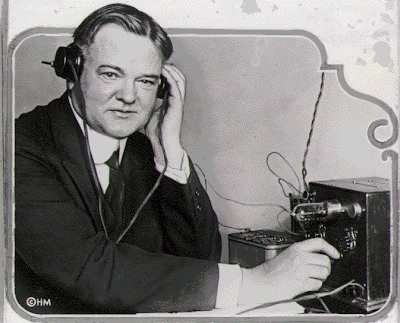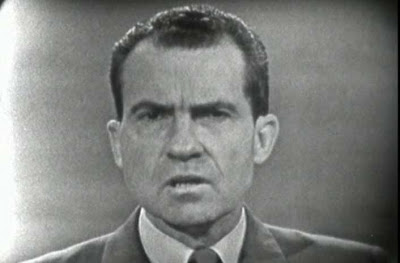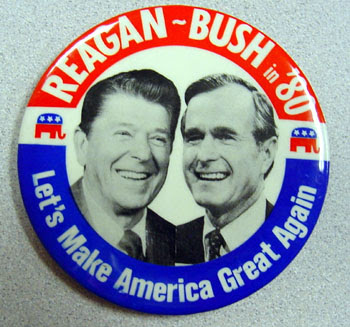While we can find some relief that our nation barely escaped a coup and no longer is under the grifting thumb of Il Douche directly, this is but a mere temporary reprise. The internet, once a shining promise of information, has devolved into a gaping sewer hole of disinformation and outlandish imbecility.
While this in itself is hardly news, we the people who prefer self governance to tyranny (and can discern the distinction between them) must keep abreast of the situation even if the conditions of public policy making are found to be repugnant. We have met the enemy, and he is willful ignorance.
Dispatch From The Front -
What's happening?
Even with Il Douche not in office, QAnon beliefs continue to infect politics.
Why it matters
The debunked conspiracy will be in play during the upcoming midterm elections, but that doesn't mean you have to fall for it.
QAnon, a fringe right-wing conspiracy theory centered on former President Donald Trump, didn't fade away when he left office. Instead, belief in the wild conspiracy persists and continues to play a part in the political discourse, whether Americans realize it or not.
The QAnon conspiracy, which first surfaced in October 2017, falsely purports that Trump was fighting some hidden war against a cabal of Satanist pedophiles in Hollywood and the Democratic Party. The nonpartisan Public Religion Research Institute -- a nonprofit that researches the intersection of religion, culture and public policy -- released a study in February showing that nearly 16% of Americans believe the core QAnon conspiracy.
"QAnon has evolved from a movement centered around Trump leading a secret military intelligence operation to save the world, into a movement that not only doesn't need Trump but doesn't even need the iconography it developed over the past four years," said Mike Rothschild, conspiracy researcher and author of The Storm Is Upon Us, which provides a history of the QAnon conspiracy theory.
Conspiracy theories can be dangerous and even deadly as seen during the COVID-19 pandemic, with vaccine misinformation playing a role in some people succumbing to the virus and particularly creating venues for the virus to mutate.
Despite being repeatedly debunked, belief in the QAnon conspiracy continues to infect areas of politics beyond Trump. So far this year, aspects of the conspiracy have seeped into protests, a Supreme Court hearing and legislation.
"Its mythology of secret pedophile rings, suppressed cures and technology, massive corruption and fraud propelling a [purportedly] decrepit Joe Biden into office, and COVID being a hoax, have infected every aspect of mainstream conservative politics and culture," Rothschild added.
With the midterm elections coming up, the conspiracy is likely to continue popping up in campaigns and on social media feeds. Being able to recognize its influence may make it easier to spot, and avoid, in the future. At least this is my hope.
Here are some of the current events that the QAnon conspiracy has latched onto, some obvious and others less so.
Midterm elections
In 2020, almost 100 candidates who expressed support for QAnon ran for office. The two most prominent candidates who won their races were Rep. Lauren Boebert, a Republican from Colorado, and Rep. Marjorie Taylor Greene, a Republican from Georgia.
This year, so far, there are 78 candidates running for office in 28 states who believe in QAnon, according to Grid News. One race, in particular, has an interesting candidate, with the person allegedly responsible for posting as Q running for office.
Ron Watkins is the former site administrator for the anonymous board 8chan and the person reported to be responsible for many of the Q drops as laid out in the Q: Into the Storm documentary series. He's also running for Arizona's 2nd Congressional District seat.
This guy is deranged and dangerous. While I find it incomprehensible that anyone could ever find credence in anything remotely associated with him, I am apparently in error regarding my faith in humanity on this front.
Watkins gained prominence among Republicans following the 2020 presidential election when he repeated claims of election fraud that have since been 100% debunked. He's one of several candidates running in the Republican primary for the seat, which will happen on Aug. 2.
Another candidate who has in the past supported QAnon, Doug Mastriano, is running to be governor of Pennsylvania. Mastriano won the Republican nomination on May 17.
He tweeted multiple times in 2018 with QAnon hashtags and slogans.
He'll go up against Democrat candidate Josh Shapiro in November..
A QAnon influencer that goes by the name Juan O. Savin -- an alias intended to sound similar to James Bond's codename "007" -- is working on a coalition to get Q faithful candidates into the secretary of state offices in South Carolina, Colorado and Nevada, according to a report from Media Matters. The 2020 presidential elections and false claims of voter fraud made Americans more aware of the responsibilities of the position of secretary of state. In many states, this is the official who helps determine whether an election had voter fraud issues..
Durham investigation
In May 2019, Attorney General Bill Barr ordered an investigation into the 2016 presidential election and tapped US Attorney John Durham to lead it. Many QAnon followers viewed this investigation as part of the "storm" that would lead to arrests of former Secretary of State Hillary Clinton and others within the Democratic National Committee. One of the last messages from Q in 2020 had only one word: Durham.
Michael Sussmann, a cybersecurity lawyer who worked with Clinton's campaign in 2016, was indicted by Durham in September for allegedly lying to the FBI. On Tuesday, a jury acquitted him of the charge.
Both Trump and Q followers shared their dismay at the US legal system after the acquittal was announced. Some also began to spin the decision to support the false conspiracy.
War in Ukraine
Since Russia invaded Ukraine in late February, Russia has been using misinformation to try to justify Russian President Vladimir Putin's decision to go to war. Both Facebook and Twitter have called out Russia for its disinformation efforts. One false narrative touted by Russia early in the invasion was that Ukraine had supposedly been developing bioweapons, a conspiracy theory that was floated by QAnon believers months earlier.
Posts from conspiracy theorists in 2021 claimed falsely that Biden and his son, Hunter, were part of a plot to develop bioweapons in foreign countries, according to Media Matters. One of the countries mentioned was Ukraine.
Days before Russia began spreading misinformation about biolabs, a conspiracy theory Twitter account shared the false claim about the labs in Ukraine. It began circulating in QAnon circles, and then quickly spread to other right-wing forums and was amplified by conservative media including Fox News' Tucker Carlson. Eventually, both Russia and China began running with the narrative of the Ukraine biolabs.
Claims of bioweapons being made in Ukraine have been proven false. The US and Ukraine do have a treaty to prevent the development of bioweapons in labs that were created when Ukraine was part of the Soviet Union. But that is hardly the same thing.
Trump's potential return to Twitter
Elon Musk in April agreed to buy Twitter for $44 billion, though the Tesla CEO has since said the deal is on hold. If he does indeed buy the social network, Musk said he will remove the platform's ban on Trump. The former president's account was banned by Twitter days after the Jan. 6 Capitol riot.This news sent some QAnon believers into a fervor on various social media platforms where they congregate such as Gab and Telegram.
They suggested Trump's possible return to Twitter was predicted by Q in 2017 and would be a sign the former president was about to confirm a crackdown on the fictional cabal. Like the entire QAnon conspiracy, this is completely false.
Trucker Convoy/Anti-vax
At the start of the year, a group of anti-vaxxers in Canada formed a movement to occupy the country's capital over vaccine requirements. Their secret weapon was the use of semi-trucks. The trucker convoy lasted weeks as trucks camped out in Ottawa before Prime Minister Justin Trudeau made use of emergency powers to force the removal of the protestors.
In March, a similar protest happened in the US with the goal of reaching Washington, DC. This version got much less attention and support, in part due to the beginning of Russia's invasion of Ukraine.
QAnon believers played a role in both the protests. COVID vaccine misinformation runs rampant in the Q communities, and that misinformation begins infecting other right-wing groups. Trucks and other vehicles in both the US and Canada were adorned with QAnon logos and slogans.
Disney Protest
Florida's Parental Rights in Education bill, also referred to by opponents as the "Don't Say Gay Bill," was signed into state law in March. Disney employees protested the company's lack of action on the bill's passage, which in turn led the company to say it'll work to repeal the law.
This drew the ire of Republican state legislators who passed a bill to remove Disney's special tax status in April. The Mickey Mouse company also became the target of QAnon believers.
Protests at the entrance of Disney World in Orlando, Florida, started in April. Those protesting chanted and carried signs referring to Disney World as "Pedo World" and the slogan "Ok, Groomer," which is a take on the "Ok, Boomer" meme.
QAnon believers not only supported these protests but also began spreading misinformation about the company and its CEO, Bob Chapek. This included exaggerating losses the company experienced due to the protests and false claims that Chapek was arrested for human trafficking and child pornography. The claims about Chapek and his arrest are completely bogus.
The internet has become less like a source of information such as an electronic encyclopedia and more like a toilet.
It's time for a courtesy flush.
A final observation for this month is that while Biden and the Democrats will be blamed for the gas prices & inflation, that's the way these things go...just remember that oil company profits have never been higher. Perhaps that fickle finger of fate should be pointing at price gouging and profiteering more than actual supply chain issues at this point.
Stop voting for imbeciles. Thankyou.


















